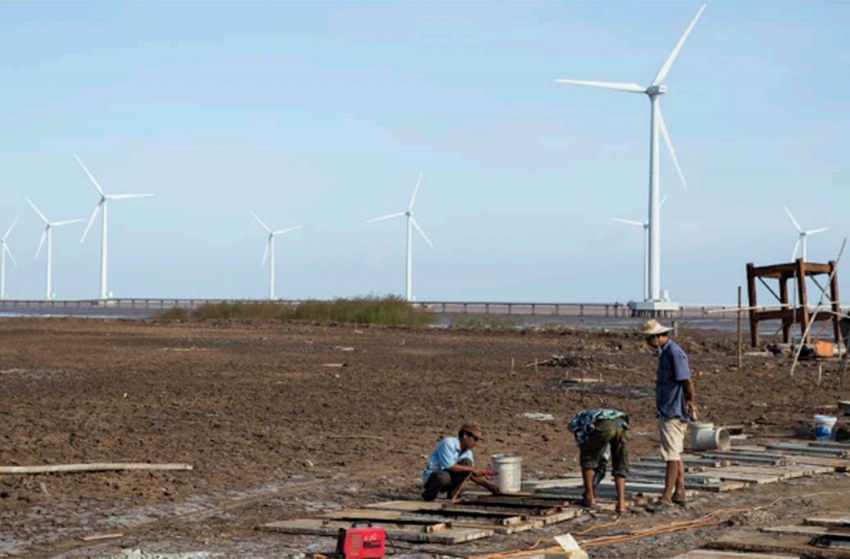Envision and Hitachi Zosen enter Vietnamese renewable energy sector
 |
| Envision and Hitachi Zosen both see great potential in the Vietnamese renewable energy sector |
Envision affirms putting $660 million into wind power project
Speaking with VIR, Ta An Quang, director of Envision Corporation’s projects in Vietnam, indicated that the company is planning to put $660 million into a wind power project in Vietnam.
According to the plan, the project will be based in Soc Trang province. It will be built on an area of 9.2 hectares and have a capacity of 300MW.
“Although Soc Trang has great potential to develop wind power projects, there has never been a project like this in operation,” said Quang.
In addition, a representative of Envision declared that Soc Trang is not the only location in Vietnam with the potential for wind power—many other locations in South Vietnam share this trait. Therefore, the company has established a specialised division for researching and investing in wind power projects in Vietnam.
“Aside from investing in Soc Trang, we are deploying investments in Ca Mau and other locations. Through research and evaluation of Vietnam’s wind resources, we found many potential locations. Envision will initiate long-term investment here,” added Quang.
Hitachi Zosen to increase cooperation and investment in waste-to-energy project
Nguyen Phi Hung, director of Global Expo and Event JSC, stated that Hitachi Zosen Corporation from Japan is boosting cooperation with domestic companies to carry out waste-to-power projects.
Accordingly, in late March, T&T Group and Hitachi Zosen signed a memorandum of understanding to develop waste-to-power electricity plants in Hanoi. The two parties will establish a joint venture to build the first project in Hanoi as well as other projects in the upcoming time.
T&T and Hitachi Zosen will create the design, collect capital, build, and operate the plant which will generate electricity by incinerating 1,000 tonnes of waste per day.
Vietnam has extensive resources to develop renewable energy. It is estimated that the technical potential of wind power in the country is 27GW. The technical potential for solar and biomass energy production is 300GW and 10.3GW, respectively.
Besides, in the 93-million country, the average waste volume discharged in the environment reaches 70,000 tonnes per day, including 35,000 tonnes from urban areas and 34,000 tonnes from rural areas. This is an exuberant resource for developing waste-to-power projects.
Vu Ngoc Tinh, director of the Advisory and Environment Technology Centre under the Ministry of Natural Resources and Environment, shared that Japanese companies are deploying many waste treatment projects in Vietnam. Their leading products include industrial waste incinerators, and environment analytical and measurement systems.
According to experts, foreign companies are becoming more and more interested in the environmental sector in Vietnam. In addition to Japanese companies, companies from Korea, Germany, and China are showing a trend for increasing cooperation with domestic companies to initiate projects. Thus, negotiations and contracts between foreign companies and Vietnamese companies will happen more frequently than before.
Recently, Kyoto Corporation entered into a co-operation with a local partner to begin a solar power project in Vinh Long province. According to the plan, the project will be constructed on an area of 60ha and will have a capacity of 48MW and investment capital of over $80 million.
According to Nguyen Huy Ky, chairman of the Board of Directors of Vinakoyo Vietnam, since realising the potential as well as the plausibility of the project, Kyoto has decided to cooperative and sign a development project with a Vietnamese partner. According to plans, the project will be completed in the first quarter of 2019.
What the stars mean:
★ Poor ★ ★ Promising ★★★ Good ★★★★ Very good ★★★★★ Exceptional
Related Contents
Latest News
More News
- TECHFEST Vietnam 2025 links startups with policy and capital (December 15, 2025 | 18:21)
- Long Thanh International Airport welcomes first Vietnam Airlines test flight (December 15, 2025 | 18:01)
- Foreign fruits flood Vietnamese market (December 09, 2025 | 13:22)
- Vietnam’s fruit and vegetable exports reach $7.8 billion in first 11 months (December 05, 2025 | 13:50)
- Vietnam shapes next-generation carbon market (November 26, 2025 | 15:33)
- PM urges Ho Chi Minh City to innovate and remain Vietnam’s economic locomotive (November 26, 2025 | 15:29)
- Experts chart Vietnam's digital finance path: high hopes, high stakes (November 14, 2025 | 10:56)
- Vietnam’s seafood imports surge 30 per cent in first 10 months (November 10, 2025 | 19:35)
- Vietnam’s durian exports hit $1 billion milestone (October 30, 2025 | 17:41)
- Beyond borders: Sunhouse and new era of Vietnamese brands on Amazon (October 28, 2025 | 10:46)

 Tag:
Tag:





















 Mobile Version
Mobile Version